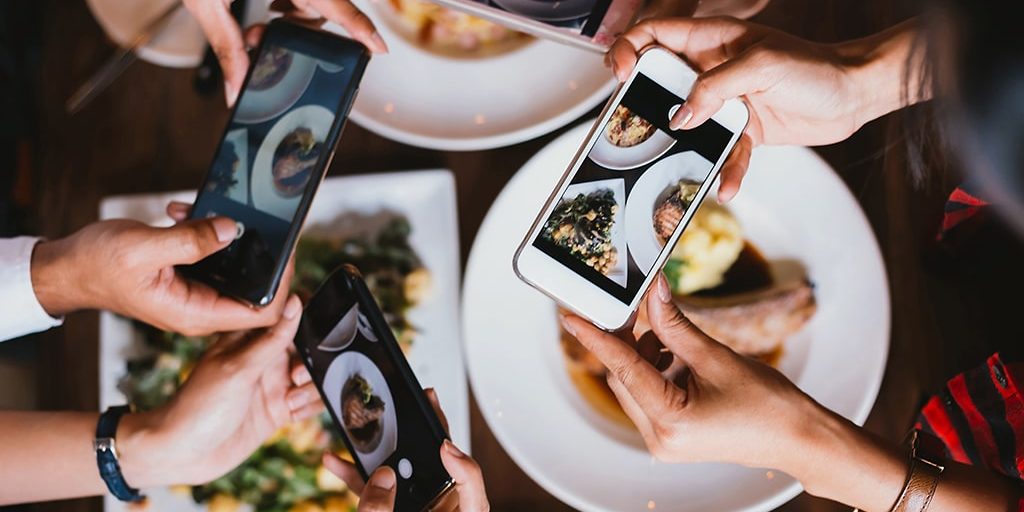Socializing comes naturally to most humans; we like to socialize and interact with others. And since all humans eat, it turns out that both things often coincide: we go out, hang out and eat.
Whether it’s some friends organizing a barbecue, a romantic dinner with our partner in a restaurant, or a family celebration, many times we end up eating away from home. And on those occasions, we may find ourselves facing some tough choices regarding what we should eat, especially if we have diabetes.
In this article we’ll give you some tips to make eating out with diabetes the best possible experience so you can enjoy your meal.

(1) Plan, anticipate and take the initiative.
If you’re going out to eat with other people, the first thing you can do is anticipate the situation. What restaurant are you going to? What kind of food do they serve? Is there an online menu you can check out beforehand? Can you walk instead of going by car?
Always try to take the initiative and suggest a restaurant or venue that suits you best. Avoid fast food spots, places where fried foods predominate, and restaurants that don’t offer healthy options. If you already know of a restaurant that is right for you, why not suggest going to that one? In addition to going to a place that you already know you will enjoy, you’ll take the pressure off the other guests of having to decide where to go and they will likely appreciate the initiative.
It is also important that you prepare and bring everything you may need. Make sure to always carry your blood glucose meter, medications, insulin, food and portion guide, and your meal plan if one has been provided to you by a nutritionist or doctor.
If you have recently been diagnosed with diabetes, it is highly recommended that you always keep your meal plan handy so you can refer to it for what you should or should not eat. When in doubt, always ask your doctor or nutritionist for help understanding how different foods affect you.
(2) Manage your mealtimes.
For most people with diabetes, meals should be spaced out throughout the day. When we eat out, the timing of these meals is affected.
When you eat away from home, try to manage the timing of your meals as much as possible. If you normally have lunch at 1pm, suggest a similar lunchtime. Keep in mind that restaurants usually take a while to serve food, so anticipate this delay in the arrival of your meal when deciding at what time to make reservations.
When selecting your dishes, ask the waiter for the estimated preparation time for each of them. Simpler dishes like salads are usually ready quite quickly, while dishes that require cooking take longer to come out. Also pack your glucose tablets or other fast-acting carbohydrates to prevent hypoglycemia in case the meal takes longer than expected and adjust your subsequent portion sizes accordingly.
If you’re going to eat later than your regular time, have a light snack at your normal mealtime and adjust the number of servings in your later meal to compensate. If you use insulin, you must also learn how it works in your body and how it interacts with your blood sugar in order to adjust the dose correctly, if needed. Make sure you consult with your doctor if you have any questions.
(3) Makes choices that don’t neglect your diet.
Being away from home doesn’t mean that you can just eat whatever you want. If you don’t follow an adequate meal plan, you run the risk of hypoglycemia, hyperglycemia, or other complications.
Eat the same amount you would eat at home. Some restaurants serve very large portions, so don’t be afraid to leave food on your plate. Eating too much won’t do you any good. If you have leftovers, you can share them with someone or take it to-go.
Be careful with bread and salt. It is quite common for restaurants to serve complimentary bread before a meal, and many people eat out of boredom or to calm their hunger while waiting for their food. Try to avoid the bread altogether, but if you do want to indulge, ask for whole wheat, high-fiber bread instead and limit the portion size. In the case of salt, remember that dishes are usually well seasoned and you don’t need the extra sodium.
Avoid fried and battered foods. Instead, choose healthier preparation methods like broiled, baked, or steamed. Also try to choose simple dishes; glazed beef tenderloin sounds very appetizing, but a grilled chicken breast with salad is much healthier.
Don’t forget to also watch what you drink. Avoid sodas and sugary drinks. Instead, opt for water or unsweetened tea.
Time for dessert… now what? If you’re not into sweets, you’ll probably just order coffee or tea (hold the sugar!), which are good choices. If you have a sweet tooth on the other hand, you probably know that choosing dessert can be an ordeal for people with diabetes. The best thing to do is to go for the healthiest option on the menu, which is usually a fruit dish. However, if you really crave a slice of cake, keep that in mind before choosing your main dish and adjust your carb servings accordingly.
(4) Ask for dish substitutions if necessary.
Most restaurants will allow substitutions to your dishes to better suit your dietary needs. Don’t be embarrassed to tell them that you have diabetes; it will help both the waiters and the cooks to better understand your needs.
Sides are the easiest thing to change. For example, substitute potatoes for a salad or steamed vegetables. Also avoid sauces made with creams, cheese, honey, or ketchup, since these tend to be high in sugar and/or fat.
If there’s nothing suitable for you on the menu, ask the waiter if they have something off the menu or if they can prepare something special. Remember, it’s okay to ask for modifications. It’s more common than you might think, and restaurant staff is often used to doing it.

(5) Always seek your doctor’s advice.
It’s normal to have doubts. It’s better to acknowledge it and ask health for a professional’s advice before going out to eat than to find yourself seated at a restaurant trying to guess what the best choice is.
Since social meal encounters are common, take advantage of your next doctor’s visit to ask about how to better manage these situations. Ask for recommendations on how to adjust your diet and what the best food selections are when eating out. Have this conversation with a dietitian as well if one is available to you. They are the nutrition experts, after all!
We hope you find these recommendations useful when it comes to eating out. Follow us for more articles like this and remember to use Enterex Diabetic as part of your Diabetes Management Plan!

